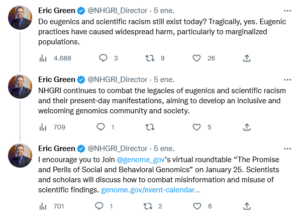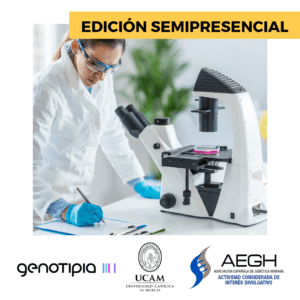Sofía Martínez-Morales, Aitor García-Anaya y Manuel Pérez-Alonso
[tabgroup title=» «]
[tab title=»Español»]
“¿Existe todavía hoy la eugenesia y el racismo científico? Trágicamente, la respuesta es afirmativa. Las prácticas eugenésicas han causado un daño generalizado, en particular sobre las poblaciones marginadas”. Con estas declaraciones, lanzadas por Eric Green, director del National Human Genome Research Institute (NHGRI) en un reciente tuit, se abre un debate que tendrá lugar próximamente en un encuentro organizado por el NHGRI.

Los avances de la genética y la genómica en las últimas décadas han sido verdaderamente espectaculares. Uno de los frentes de interés de este campo de la ciencia es la utilidad que puede tener para comprender las diferencias entre las personas a nivel social. Esto es un aspecto muy controvertido de la ciencia, que será tratado en el evento que describimos a continuación.
El evento, que ha sido convocado con fecha 25 de enero de 2023, se ha organizado en formato debate con una mesa redonda bajo el título “Expectativas y peligros de la genómica social y del comportamiento” (The promise and perils of social and behavioral genomics). Este debate se transmitirá vía online y su inscripción requiere solicitud previa a través del siguiente enlace, en el que además se puede acceder a toda la información relacionada: https://www.genome.gov/event-calendar/roundtable-discussion-the-promise-and-perils-of-social-and-behavioral-genomics
La mesa redonda ha sido organizada por el NIH, siglas referidas a los National Institutes of Health, concretamente por una de las instituciones que conforman los NIH de Estados Unidos: el National Human Genome Research Institute (NHGRI). Este instituto de investigación fue fundado en 1989 con el objetivo, ya conseguido, de crear un mapa de referencia del genoma humano. El NHGRI investiga sobre la estructura y función del genoma, descifra las bases moleculares de las enfermedades humanas y realiza investigación clínica para establecer cómo usar la información genómica con el objetivo de mejorar los tratamientos médicos.
Además de los muchos proyectos e investigaciones que tienen en marcha en el NHGRI, ahora han preparado esta mesa redonda para invitar a la reflexión sobre las implicaciones éticas y científicas de la genética aplicada a los aspectos de la vida social y cuál puede ser el futuro de estas investigaciones. Se van a plantear preguntas tales como las siguientes: ¿ha impulsado la genómica social el surgimiento de la supremacía blanca en Estados Unidos? ¿Qué papel ha jugado la evidencia genética en eventos como el tiroteo masivo de Buffalo en 2022 y la violencia extremista? ¿Cómo el cálculo incompleto de la historia del racismo científico y la eugenesia en genética/genómica ha llevado a ideologías dañinas y comprometido la integridad científica? En esencia, se va a discutir sobre los peligros del mal uso de la genética aplicada al ámbito social, como por ejemplo perpetuar prejuicios sociales que van en contra de la sociedad y, especialmente, de los colectivos más vulnerables. También se hablará sobre el uso perverso de la genética y genómica como medio para la justificación de la violencia, injusticias, antisemitismo, miseria, desigualdad…
Conocer las diferencias genéticas entre las personas puede permitir identificar las bases biológicas que influyen sobre nuestros patrones de pensamiento, sentimientos y comportamiento, lo que puede verse reflejado en tendencias a responder de cierta manera bajo ciertas circunstancias. Sin embargo, un reciente estudio pone de manifiesto la manera en que se ha hecho mal uso de la información científica, con conclusiones manipuladas para justificar comportamientos racistas. El título de este estudio, publicado en la web undark.org, es “La genética y la creación de mitos raciales” (A Field at a Crossroads: Genetics and Racial Mythmaking).
El encuentro va a contar con prestigiosos ponentes de la talla de Eric Green, director del NHGRI, quien dará la bienvenida al encuentro junto con Cristopher Donohue, investigador de ese mismo instituto. En este evento también participarán otros investigadores, tales como Nayanika Ghosh de la Universidad de Harvard, Erik Parens de The Hastings Center, Alexandra Minna Stern de la Universidad de California LA, Ashley Smart del Massachussetts Institute of Technology, Daniel Benjamin de la Universidad de California LA, Daphne Martschenko de la Universidad de Stanford, Aaron Panofsky de la Universidad de California LA, Prabarna Ganguly de Nucleus Genomics, Chris Gunter del NHGRI, Sarah A. Bates del NHGRI y por último Rina Bliss de Rutgers University.

Este interesante debate se va estructurar de la siguiente manera: primero, tendrá lugar una bienvenida e introducción. Tras ello, comenzará la discusión moderada bajo el siguiente título: “La genética en la investigación social y del comportamiento en la postguerra” (Genetics in postwar social and behavioral research). Tras cada discusión se abrirá una ronda de preguntas para que la audiencia pueda interpelar directamente a los panelistas. Seguidamente, se hará un breve descanso y se retomará la mesa redonda con la siguiente discusión. En esta ocasión, se hablará sobre el estado de la ciencia en relación con este ámbito. El último debate de la jornada lleva el siguiente título: “Preocupaciones contemporáneas y retos en la comunicación” (Contemporary Concerns and Communications Challenges). Finalmente se cerrará el encuentro con una última ronda de preguntas por parte de la audiencia, que terminará dando paso a las conclusiones o puntualizaciones más relevantes.
Este es un evento muy importante para el ámbito de la genómica social, de la mano de científicos preocupados por el mal uso de la ciencia. Existen sectores de la comunidad científica que consideran que las diferencias biológicas entre las personas pueden ser el pretexto para justificar la existencia de una jerarquía biológica y que eso mismo puede alimentar las ideologías sobre inferioridad y superioridad. Hay otros sectores que, durante un tiempo de la historia, han aplicado políticas científicas en defensa de la eugenesia. Esta falta de integridad científica debe dar lugar a establecer limitaciones éticas con claridad. Este es un encuentro en el que se va a hablar de lo que ha pasado al respecto, del punto en el que nos encontramos y del futuro que debemos tomar.
Cuando culminó el Human Genome Project (consorcio integrado por el NIH, el DOE, Departamento de Energía de los Estados Unidos, financiado por el congreso de Estados Unidos) tuvo lugar uno de los hallazgos más importantes de la Historia de la Ciencia. Se consiguió generar la primera secuencia del genoma humano, lo que sin duda ha permitido acelerar el estudio de la biología humana y mejorar la práctica de la medicina. La aplicación de todo este conocimiento en las ciencias sociales constituye un nuevo reto.
Debates como el que aquí hemos mencionado también se están desarrollando en Europa. Recientemente, ha tenido lugar una Conferencia Europea sobre Genómica aplicada a las Ciencias Sociales (Bolonia, mayo de 2022). Aquí se ha tratado ampliamente el problema de las desigualdades sociales y su relación con las variantes genéticas individuales.
El uso de los test genéticos para comprender las diferentes tendencias de comportamiento de las personas puede ser una realidad en los próximos años. De hecho, una empresa del Parque Científico de la Universitat de València (Mendel´s Brain) ya ofrece un test de ADN aplicado a la psicología. Este test permite al usuario conocer su predisposición biológica a experimentar estrés o ansiedad, entre otros rasgos psicológicos. Otras empresas dedicadas a la genómica personal, tales como 23andMe y tellmeGen, también incluyen en su portfolio pruebas de este tipo.
Sin ninguna duda, los Comités de Ética de los centros de investigación que trabajen en el campo de la genética aplicada a la psicología y las ciencias sociales, al igual que las empresas relacionadas, tendrán que intervenir para asegurar que la ciencia se utilice siempre en beneficio de la sociedad, especialmente de los colectivos vulnerables.
Sofía Martínez-Morales es estudiante de doctorado de la Universitat de València
Aitor García-Anaya es director técnico y CEO de Mendel´s Brain SL
Manuel Pérez-Alonso es catedrático de genética de la Universitat de València
[/tab]
[tab title=»English»]
Debate on the ethics of genomics and genetics in social science and the study of behavior
Does eugenics and scientific racism still exist today? Tragically, the answer is yes. Eugenic practices have caused widespread harm, particularly on marginalized populations. With these statements, launched by Eric Green, director of the National Human Genome Research Institute (NHGRI) in a recent tweet, a debate is opened that will take place in a meeting organized by the NHGRI.
 Advances in genetics and genomics in recent decades have been truly spectacular. One of the fronts of interest in this field of science is the understanding of the differences between people at a social level. This is a very controversial aspect of science, which will be dealt with in the event that we describe below.
Advances in genetics and genomics in recent decades have been truly spectacular. One of the fronts of interest in this field of science is the understanding of the differences between people at a social level. This is a very controversial aspect of science, which will be dealt with in the event that we describe below.
The event, which has been convened on January 25, 2023, has been organized in a debate format with a round table under the title “The promise and perils of social and behavioral genomics”. This debate will be broadcast online and registration requires a request through the following link, where you can also find all the related information: https://www.genome.gov/event-calendar/roundtable-discussion-the-promise-and-perils-of-social-and-behavioral-genomics
The round table has been organized by the NIH, an acronym referring to the National Institutes of Health, specifically by one of the institutions that make up the NIH of the United States: the National Human Genome Research Institute (NHGRI). This research institute was founded in 1989 with the goal, already achieved, of creating a reference map of the human genome. The NHGRI investigates the structure and function of the genome, deciphers the molecular basis of human diseases, and conducts clinical research to establish how to use genomic information to improve medical treatments.
In addition to the many projects and investigations of the NHGRI, they have now prepared this round table on the ethical and scientific implications of applied genetics, also discussing aspects of social life and what the future of genetics may be. They will discuss questions such as: Has social genomics fueled the rise of white supremacy in the United States? What role has genetic evidence played in events like the 2022 Buffalo mass shooting and extremist violence? How has the undercalculation of the history of scientific racism and eugenics in genetics/genomics led to harmful ideologies and compromised scientific integrity? In essence, they will discuss the dangers of missusing genetics applied to the social sphere, such as perpetuating social prejudices that go against society and, especially, against the most vulnerable groups. There will also talk about the perverse use of genetics and genomics justifying violence, injustice, anti-semitism, misery, inequality…
Knowing genetic differences between people can allow us to identify the biological bases that influence our patterns of thinking, feelings and behavior, which can be reflected in tendencies to respond in a certain way under certain circumstances. However, a recent study reveals the way in which scientific information has been misused, with manipulated conclusions to justify racist behavior. The title of this study, published on the website undark.org, is “A Field at a Crossroads: Genetics and Racial Mythmaking”.
The meeting will have prestigious speakers such as Eric Green, director of the NHGRI, who will welcome the meeting together with Cristopher Donohue, a researcher from the same institute. Other researchers will also participate in this event, such as Nayanika Ghosh from Harvard University, Erik Parens from The Hastings Center, Alexandra Minna Stern from the University of California LA, Ashley Smart from the Massachusetts Institute of Technology, Daniel Benjamin from the University of California LA, Daphne Martschenko from Stanford University, Aaron Panofsky from the University of California LA, Prabarna Ganguly from Nucleus Genomics, Chris Gunter from NHGRI, Sarah A. Bates from NHGRI and lastly Rina Bliss from Rutgers University.
This interesting debate will be structured as follows: first, there will be a welcome and introduction. After that, the moderated discussion will begin under the following title: “Genetics in postwar social and behavioral research”. After each discussion, a round of questions will be opened so that the audience can ask the panelists directly. Then, there will be a short break and the round table will resume with the following discussion. On this occasion, the state of science in relation to this field will be discussed. The last debate of the day bears the following title: «Contemporary Concerns and Communications Challenges”. Finally, the meeting will close with a final round of questions from the audience, which will end up giving way to the most relevant conclusions.
This is a very important event for the field of social genomics, held by scientists concerned about the misuse of science. There are sectors of the scientific community that consider that the biological differences between people can be the pretext to justify the existence of a biological hierarchy and that this can feed ideologies about inferiority and superiority. There are other sectors that, during a time in history, have applied scientific policies in defense of eugenics. This lack of scientific integrity should lead to clearly establishing ethical limitations. This is a meeting in which they will talk about what has happened in this regard, the point at which we find ourselves and the future that we must take.
When the Human Genome Project (consortium made up of the NIH, DOE, United States Department of Energy, financed by the United States Congress) came to an end, one of the most important discoveries in the History of Science took place. It was possible to generate the first sequence of the human genome, which has undoubtedly made it possible to accelerate the study of human biology and improve the practice of medicine. The application of all this knowledge in the social sciences constitutes a new challenge.
Debates like the one we have mentioned here are also taking place in Europe. Recently, a European Conference on Genomics applied to the Social Sciences has taken place (Bologna, May 2022). Here the problem of social inequalities and its relationship with individual genetic variants has been extensively discussed.
The use of genetic tests to understand the different behavioral tendencies of people may be a reality in the coming years. In fact, a company from the Science Park of the University of Valencia (Mendel’s Brain, Spain, Europe) is the first company in Europe to offer a direct-to-consumer DNA test applied to psychology. This test allows the user to know their biological predisposition to experience stress or anxiety, among other psychological traits.
Undoubtedly, the Ethics Committees of research centers that work in the field of genetics applied to psychology and the social sciences, as well as related companies, will have to intervene to ensure that science is always used to benefit of society, especially vulnerable groups.
Sofía Martínez-Morales is a doctoral student at the University of Valencia
Aitor García-Anaya is technical director and CEO of Mendel’s Brain SL
Manuel Pérez-Alonso is a professor of genetics at the University of Valencia
[/tab]
[/tabgroup]
Si te ha gustado esta noticia y quieres aprender más sobre Genética en Medicina, te interesan nuestros cursos y formación universitaria, así como nuestro canal audiovisual, Genotipia TV.
